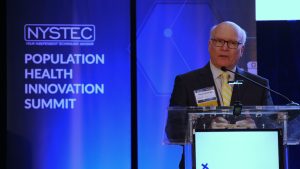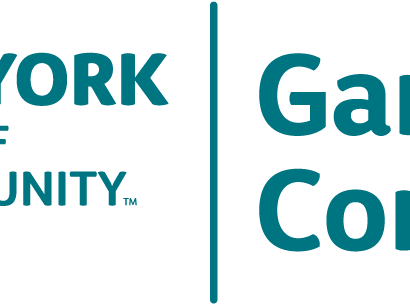

On June 6, 2023, NYSTEC held its Population Health Innovation Summit (PHIS), focusing on innovations promoting mental health and well-being. The hybrid event was on-site at the Capital Center in Albany, with the option to attend virtually.
The 2023 summit was the second event that has been in hybrid format. Launched in 2017, PHIS is supported by NYSTEC’s Population Health Strategy team.
Equity in Mental Health and Well-being
This year’s summit focused on innovative programs, partnerships, and research across New York State that are promoting mental health and well-being. Mental health, a longstanding priority in NYS, is a complex component of overall wellness and a vital part of building resilient communities.
During the event, speakers highlighted how their organizations fostered partnerships and drove change to promote equity in mental health and how services were delivered. Frontline implementers and experts from across the state presented case studies and took part in engaging discussions, sharing results from their groundbreaking work in the communities they served.
“We share the same vision of embracing creative solutions to improve mental health for all New Yorkers—and in the process, demonstrate that doing more in partnership, genuinely with the communities that have been most affected, we will begin to establish trustworthiness and then, perhaps, real change in mental health equity,” said NYSTEC President & CEO Kevin Owens.
The Day at a Glance
Participants enjoyed a full day of presentations and discussions, facilitated by sports reporter and New England Sports Network host Chelsea Sherrod as master of ceremonies.

Keynote on Transforming and Strengthening New York State’s Mental Health System
Dr. Smith described New York State’s comprehensive $1 billion multi-year plan to transform the continuum of mental health care, from prevention to treatment to recovery, and reduce the number of individuals with unmet mental health needs throughout the state. Dr. Smith highlighted specific initiatives that aimed to dramatically expand access to mental health care, reduce wait times, and ensure appropriate levels of care to strengthen New York’s mental health care system and the people it serves.

Presentation on Peer-to-Peer Engagement Among Veterans
Following the keynote was a panel discussion on “Falling Between the Cracks: Discussing Peer-to-Peer Engagement Among Veterans” The panel allowed attendees to hear from the NYS Dwyer Coalition facilitator as well as the sibling of a veteran who died due to a drug overdose. These two dynamics allowed attendees to understand peer-to-peer services and hear the challenges that occur within the military community. The barriers that prevent housing, the miscommunication that affects marriage, the loss of intimacy because of military sexual trauma, and the isolation that leads to suicide are just a few topics that were discussed. This presentation allowed attendees to see the impairment that many Veterans experience.

Panel on A Multisectoral Neighborhood-based Community Coalition
Harlem Strong addresses the intersecting risks of mental health concerns, social and economic factors, and institutional racism through a neighborhood-based multisectoral coalition of community, faith-based, mental health, social service, health, and city organizations focused on mental health integration and coordination of care across Harlem. The program is led by the CUNY Center for Innovation in Mental Health, Harlem Congregations of Community Improvement, the Harlem Health Initiative, and Health First. During the panel, audience members learned more about the project’s goals of promoting mental health awareness, their key housing partners and their roles, how they implemented a task-sharing model to build capacity in the community, and how their coalition model strengthened community resilience.

Presentation on Minoritized Women Involved in Substance Use
The next presentation addressed the limitations of clinical and community services for minoritized women involved in substance use and the myriad of social and cultural determinants that prevent access and engagement of these services. There was a focus on structural racism and its impact on the design, access, and availability of services for this population. Intersectionality was highlighted as an effective tool in designing novel strategies to enhance recovery and social well-being.

Presentation on Supporting the Next Generation of Behavioral Health Solutions in Leveraging Community
This presentation encapsulated the relational approach to mental health and recovery pioneered by the MHANYS CarePath Program and expanded through the MHANYS Mental Health Community Partners Program. Participants learned the importance of a relational approach to mental health as a means to combat the individualistic Western Euro-centric bias in traditional mental health approaches, combat cultural mental health stigma, and successfully address mental health needs of families of color, immigrant families, and families belonging to groups that have been historically marginalized and underrepresented in the mental health field.

Presentation on Social Media, Tech, and the Resulting Impact on Population Mental Health
The presentation following lunch focused on the nexus of social media, technology, and population mental health. Attendees gained insights into the effects of digital platforms on mental well-being. The discussion centered around strategies for responsible technology use and reviewing outcomes of excessive use, particularly for adolescents. Warach spotlighted commonly used communication channels, highlighting their role in shaping individual and community mental health. The session aimed to equip the audience with a comprehensive understanding of social media and technology’s impact on mental health, offering strategies to mitigate adverse effects and promote responsible technology use for collective mental well-being.

Presentation on 988 in NYS
This afternoon presentation provided an overview of the implementation of 988 in NYS and how it was envisioned to connect with mobile crisis, crisis residential, crisis stabilization, and other community supports. 988 presented an opportunity to reach millions in emotional distress while de-stigmatizing help-seeking and providing immediate connection to highly trained, local crisis counselors who provide emotional support and instantaneous assistance for mental health, substance use, and suicide prevention.

Panel on Prioritizing Employee Mental Health and Well-being in the Workplace
The final panel of the day addressed the well-being of employees, as it plays a crucial role in the success and sustainability of companies and organizations. This panel session dove into the significance of prioritizing employee mental health and well-being and explored strategies for fostering a supportive and thriving work culture. The distinguished speakers provided valuable insights into, and shared their experience and practical recommendations for, promoting employee well-being within the workplace.

Mental Health and Well-being Innovation Presentations
For more information about PHIS 2023, and to see videos of the presentations, visit nystec.com/events/2023-population-health-innovation-summit.


